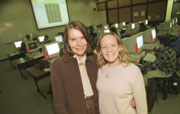

|
Als return to Molson

The Montreal Alouettes' move to McGill's Percival Molson Memorial Stadium last year was a hit with their fans; last season there was an average of 16,147 fans per game as compared to the 9,623 who showed up the previous year at the troubled Olympic Stadium.
"The fantastic atmosphere and ambience in the stadium have made McGill the place to be to watch professional sports in Montreal," says Alouettes president Larry Smith.
Not surprisingly, the football club has renewed its contract with McGill and, like last year, it will make additional renovations to the facility, in lieu of rent.
Fans can expect improved seats and washrooms, while Alouette players will have better team rooms. Last year, the $400,000 worth of renovations went mainly to improving the seats.
A further plus for both McGill and the Als this year is that Molson Breweries is now the official sponsor of the team -- as opposed to last year's Labatt Breweries -- further underlining the Molson connection. "The Molson family and foundation are close to us," says Robert Dubeau, director of athletics. He adds that he's pleased as punch that the Als are returning.
"For McGill, beyond the benefit of having the renovations done, it's another activity. Our students like it and every second weekend, the public meanders through the campus on their way to the stadium and gets to see how nice the buildings are and what a nice downtown campus this is."
|
New Globe on the map

The title "Globe" may seem odd given that the subject is Quebec, but a perusal of the first two issues of this new multidisciplinary journal soon elucidates the situation. Subtitled Revue internationale d'études québécoises, Globe seeks to cover Quebec issues from a comparative and international point of view, says one of its founders, Stephan Gervais, research associate in McGill's Programme d'études sur le Québec.
"Our objective is to bring together all Québécists from here and around the world and to discuss matters in a comparative way," he says, using an example that could appear in an upcoming issue on the Quiet Revolution. "We might, for instance, compare art during that period with Catalonian art of the same period. There are many points of comparison between us and others."
Another example, Gervais cites, is a comparison of Quebec's language policy with that of Belgium and the United Kingdom, to be covered in next fall's issue on language.
The 32 members of Globe's advisory committee come from places as far-flung as China, Mongolia, Poland, Russia, Germany and Sweden, and include McGill professors Alain Gagnon from Études québécoises and Desmond Morton from the McGill Institute for the Study of Canada. The editorial board includes Gervais, Pierre Coulombe, this year's Desjardins professor in the PEQ, Pamela Lipson , a McGill graduate in French literature and Peter Graefe, a political science graduate from McGill.
The French-language journal wants to reach as many readers as possible regardless of their ability to pay for Globe. A note in the opening pages says that those scholars or institutions from countries with little money for journals may subscribe to the twice-yearly publication for free.
For more information, Globe's website is: www.cam.org/~inuk/
|
Electronic classroom on-line

Thanks to the generosity of the Students' Society of McGill University and Phyllis and (Principal) Bernard Shapiro, the McLennan Library now has an "electronic classroom" consisting of 24 networked computers.
Situated on the library's ground floor, the $200,000-plus room will allow library staff to learn the new information systems, then teach students, professors and staff how to access information from library and information systems. Says SSMU vice-president (university affairs) Sam Johnston, an admitted reticent user of computer technology, "It's incredibly user-friendly."
Students have contributed $10 per year since 1996 to the Library Improvement Fund, Johnston notes. "We're part-owners of this library and we should take pride in that."
The SSMU contributed $100,000 from the $425,000 raised by the fund last year, an amount earmarked for state-of-the-art networked computers, while the University and the Shapiros paid for the construction of the new room.
From the point of view of Frances Groen, director of libraries, "it's a wonderful, valuable gift." The new facility will "better instruct students on how to use resources on the Internet," she said, adding that the mere accessibility of the networked computers is a boon to the many students who don't have laptops.
|
|

|




